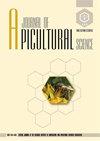Influence of the Type of Pollen Diet on the Survival, Body Weight, and Immune Response in the African Honeybee
IF 0.8
4区 农林科学
Q4 ENTOMOLOGY
引用次数: 0
Abstract
Abstract Pollen nutrition is critical for the development and well-being of the honeybee. Previous studies have compared the effect of pollen and carbohydrate-only diet on honeybee physiology. The effect of a monofloral versus polyfloral diet on the African honeybee (Apis mellifera scutellata) is poorly understood. This knowledge is critical as diversity-rich habitats are being altered to less diverse environments through increased urbanization and intensified agricultural activities, particularly in sub-Saharan Africa. Here, we report how lowly diverse (LD) and highly diverse (HD) pollen diets influence honeybee life-history traits and physiology. To achieve this, we fed caged bees with the two pollen diets and tested their effects on the parameters of survival, body weight, pollen consumption, and immune response. HD-fed bees had significantly higher survival and greater pollen consumption than LD-fed bees. However, LD-fed bees were heavier than HD-fed bees. The correlation between body weight gain and pollen consumption was expressed strongly in HD-fed bees than in LD-fed bees. Overall, our findings reveal the benefits that the highly diverse polyfloral diets provide to honeybee workers. This study shows how pollen diversity influences honeybee life-history traits, thus informing the need for conserving the biodiversity of environments for safeguarding the health of honeybees and other pollinators.花粉摄食类型对非洲蜜蜂生存、体重和免疫反应的影响
花粉营养对蜜蜂的发育和健康至关重要。以前的研究比较了花粉和纯碳水化合物饮食对蜜蜂生理的影响。单花与多花饮食对非洲蜜蜂(Apis mellifera scutellata)的影响尚不清楚。这方面的知识至关重要,因为由于城市化的加剧和农业活动的加剧,特别是在撒哈拉以南非洲,多样性丰富的栖息地正被改变为多样性较少的环境。在这里,我们报告了低多样性(LD)和高多样性(HD)花粉饮食如何影响蜜蜂生活史性状和生理。为了实现这一目标,我们给笼养蜜蜂喂食两种花粉饲料,并测试它们对生存、体重、花粉消耗和免疫反应等参数的影响。饲喂hd的蜜蜂存活率和花粉消耗显著高于饲喂ld的蜜蜂。然而,ld喂养的蜜蜂比hd喂养的蜜蜂重。高脂饲料的蜜蜂体重增加与花粉消耗之间的相关性强于低脂饲料的蜜蜂。总的来说,我们的研究结果揭示了高度多样化的多花饮食为蜜蜂工蜂提供的好处。本研究揭示了花粉多样性如何影响蜜蜂的生活史特征,从而为保护蜜蜂和其他传粉媒介的健康而保护环境生物多样性的必要性提供了信息。
本文章由计算机程序翻译,如有差异,请以英文原文为准。
求助全文
约1分钟内获得全文
求助全文
来源期刊

Journal of Apicultural Science
ENTOMOLOGY-
CiteScore
1.70
自引率
0.00%
发文量
9
审稿时长
>12 weeks
期刊介绍:
The Journal of Apicultural Science is a scientific, English-language journal that publishes both original research articles and review papers covering all aspects of the life of bees (superfamily Apoidea) and broadly defined apiculture. The main subject areas include:
-bee biology-
bee genetics-
bee breeding-
pathology and toxicology-
pollination and bee botany-
bee products-
management, technologies, and economy-
solitary bees and bumblebees
 求助内容:
求助内容: 应助结果提醒方式:
应助结果提醒方式:


